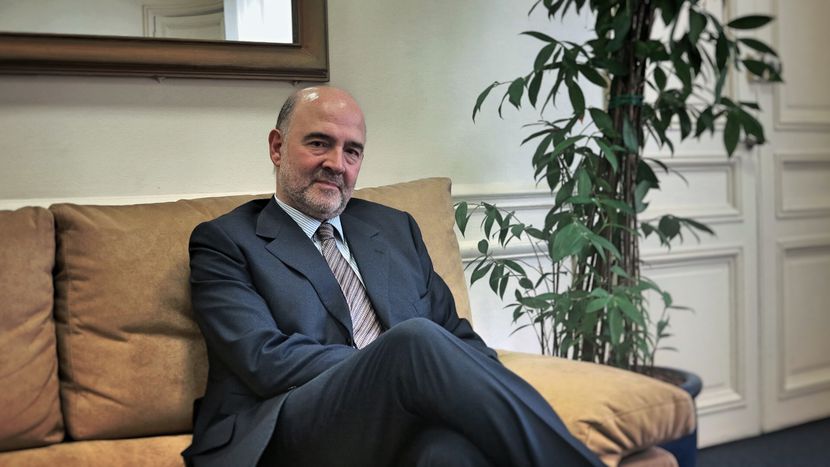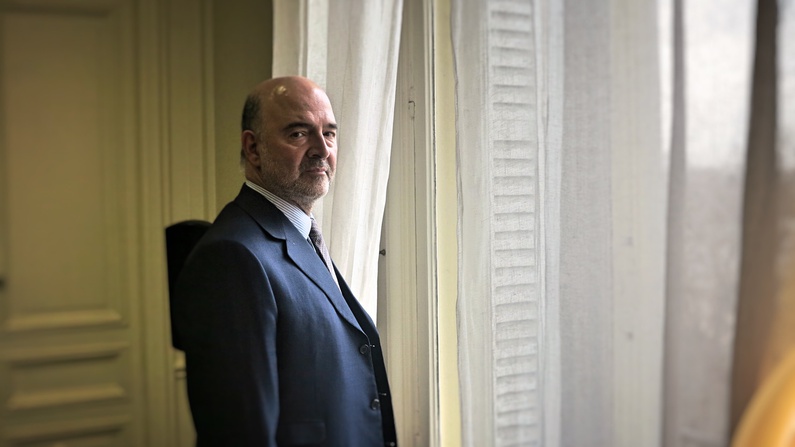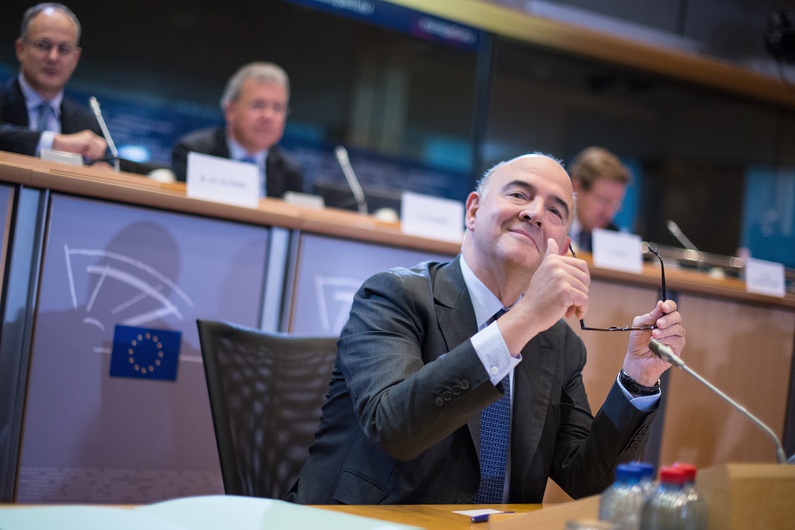
Pierre Moscovici: "Europeans need to be on the offensive"
Published on
Translation by:
 Nick
Nick
When Pierre Moscovi entered the European Commission, people said he was "playing catch-up." But a little over two years since taking up his post, the European Commissioner for Economic Affairs and former French Finance Minister swears he's having a ball in Brussels. We chat to a man who has managed to weave his way between the end of austerity, financial scandals and rising populism.
cafébabel: How is the lifestyle of a Commissioner different from that of a minister in Paris?
Pierre Moscovici: Firstly, there are similarities. The subject matter in my current job is often the same as it was in my former post as Minister of the Economy and Finance in France. The difference is that there are areas in which the Commission is much stronger. On matters of European and international finance, the Commission is much more powerful. Being a Commissioner undoubtedly carries more weight.
cafébabel: You prefer it?
Pierre Moscovici: Without a doubt! I'm reaching an age where you start to look back at what you have achieved. It's a bit sad, but it's true. I'm going to be 60, which means it's been 25 years since I entered politics. Ever since my first mandate as a member of the European Parliament, I've been aware that Europe has been a common thread running through my life. Being a European Commissioner is a sort of accomplishment. From now on, I have the feeling that I'll be at the heart of the machine. At the Commission, you have a greater freedom than as a minister. So, I'm enjoying myself. It's the best assignment I've ever had, and I'm having a ball there.
cafébabel: When you took up your post at the Commission, your nomination wasn't exactly unanimous. There was even talk of a "catch-up Commissioner". Now that you have been in the role for two years, how would you evaluate your performance?
Pierre Moscovici: It wasn't really that I was catching up. It was more that as a Commissioner, I was a hostage to complicated transactions between the two largest groups in Parliament: the conservatives and the social democrats. I didn't have to catch up; in fact, personally I was well-received. It's not for me to judge, but two years later, I believe I am among the 4-5 commissioners with the largest portfolios.
cafébabel: Are you motivated by pride?
Pierre Moscovici: The European Commission's budgetary stance is much more favourable to growth, and therefore much less "austere." In terms of the fight against tax evasion, the Juncker Commission has become an uncontested champion. We are making giant steps forward, notably thanks to the end of banking secrecy and to exchanges between the tax administrations of large companies: what we call "country-by-country reporting." I am also committed to ensuring that a list of European tax havens is published in 2017, which has never been done before. Finally, when it comes to Greece, the Commission has positioned itself on the right side of history. We are looking for solutions that will allow the country to recover. When I look at that, I tell myself that what I have done can't be totally useless.
 cafébabel: A few days after you took office, the Luxleaks scandal broke out and implicated your president at the Commission, Jean-Claude Juncker. What kind of environment were you working in?
cafébabel: A few days after you took office, the Luxleaks scandal broke out and implicated your president at the Commission, Jean-Claude Juncker. What kind of environment were you working in?
Pierre Moscovici: Firstly, I wasn't expecting to be named tax commissioner. I thought I was going to become Commissioner for the Economy and Finance. I found out during the president's press conference. Having known Jean-Claude Juncker for more than 20 years, I don't think he's a man who does anything by chance. If he chose me, it's because he intended to be proactive and aggressive in this area. Naming a social democrat to taxes is not the same thing as naming a conservative for whom an intervention clashing with certain practices of multinationals does not come naturally. Juncker is a very good politican. When a scandal like Luxleaks emerges, there are always two options. The first is denial: you stick your head in the sand and you wait for it to pass. You're dead. Jean-Claude Juncker's reaction was that of a good judoka: if there is a problem, rather than denying it exists, you go on the offensive.
cafébabel: Be that as it may that scandal, like the Bahama Leaks scandal that implicated Commissioner Neelie Kroes, piled even more problems onto an institution already associated with the power of lobbies, with negotiations, with the corridors of power...
Pierre Moscovici: I think it's exactly the opposite. Firstly, no lobby can enter Brussels unless it belongs to a register, and all meetings are public. That is not the case for national ministers, nor is it so for national or European parliamentarians. If you want to know who I'm meeting with, it's public knowledge! I am not influenced by any lobby. There are no night-time visitors at the European Commission. Nobody comes in through a little hidden door. We are not cold and opaque. We are much more transparent than any other institution. I am well-placed to tell you that the Commission and the [French] Ministry of Finance are like night and day. When I was at Bercy (office of the French Minister of Finance, Ed.), no one could know when someone was coming to see me. In French politics, there are night-time visitors at all levels. In Brussels, that doesn't happen.
cafébabel: Why do people still have difficulty believing you? Why is there still this image of a European House of Cards?
Pierre Moscovici: It's a fantasy. It's well-known that falsehoods about Europe are the norm. When it comes to Europe, I am really of the opinion that the story is simple: if you want to drown your dog, you say it has rabies. The amount of filthy nonsense, and the number of lies that you read about Europe is significant. And responding to them sometimes feels like emptying the sea with a spoon. In reality, there is a tendency to discredit Europe because it is a common response to collective problems. Some people would prefer to return to the system of nation-states, but I would say to them: sweep in front of your own door! I was a minister for seven years and have been a parliamentarian for 20. I can tell you that when it comes to preventing conflicts of interest, to transparency or to the importance of rules, there is no contest: the European Commission does a better job than individual states.
cafébabel: You are anti-austerity, you prefer to congratulate rather than to punish and in your latest book - S'il est minuit en Europe - you criticise globalisation. What is your view on citizens' movements like Nuit Debout?
Pierre Moscovici: I'm very interested by them. A Commissioner has to keep in touch with real life, too. Nuit Debout, like other citizens' movements, interests me because it presents both a dream and a protest. On the other hand, I do not have a naïve view of globalisation like some anti-globalists, for whom the phenomenon is entirely negative. Globalisation has brought technological progress, it has boosted exchanges, it has created opportunities. But globalisation isn't all positive. Many men and women feel left behind. They feel as though their futures are going to be more difficult than those of their parents. But these people don't always attend Nuit Debout's meetings. Its greatest strength is their ability to dream. Its weakness is that it struggles to find a political outlet.
cafébabel: More than 4 million young Europeans are unemployed: 18% of people under the age of 25. Young people are convinced that they are continuing to pay for others' mistakes. What response can Europe give them?
Pierre Moscovici: In some countries, the figures are even higher. They are higher in France, it's 50% in Greece, it's almost 50% in Spain. We are faced with the threat and the danger of creating a lost generation. But young people are also paradoxical when it comes to Europe. Naturally, they are the most willing to sign up to the values of an open society. Young people are intuitively aware that exchanges are a positive factor when it comes to getting a job. That's the reason why projects like Erasmus + are so successful. Among people who have experienced an Erasmus exchange, statistics show that 83% have a sense of European identity. But I want Erasmus to go further. I don't think we should be satisfied with just university Erasmus exchanges; instead we should also move towards an 'Erasmus pro', which would be open to apprentices.
On the other hand, there is a growing idea that "Europe is good, but it's not for me." The challenge for politicians is to make Europe accessible to young people, and thereby to ensure that young Europeans feel that they have a future. To do that, we need to change things. The European budget is focused far too heavily on the past. I hope that in the future, we can have a budget much more focused on education and human capital. The EU also needs to invest, because that means preparing for the future. Invest in digital technology, in transport, in energy efficiency and in universities. Finally, we need policies specifically oriented towards young people. For example, the European Solidarity Corps, which allows 100,000 young people to work for a local authority, an NGO or a charity. It is, simultaneously, a means of advancing cultural understanding and a path to employment.
cafébabel: If you talk like that to an 18 year-old, there is a danger they won't understand ...
Pierre Moscovici: But if you tell them that they will be able to benefit from an Erasmus +, no matter what their goals are, they will understand. One last thing that I would say to that 18 year-old: don't be passive. Get involved, express yourself and above all, vote. Don't be submissive. I think that young people are perfectly capable of understanding language like that.
cafébabel: Erasmus has been around for 30 years, and no one has ever heard of the European Solidarity Corps. Why is it that no young person today is able to state one concrete measure that Europe has taken in the past 10 years?
Pierre Moscovici: I think that Europe has a communication problem. The European Union is seen as a behemoth, but in reality, it's quite a small organisation. The EU is made up of 33,000 civil servants. When I was Minister of Finance in France, there were 163,000 civil servants at Bercy alone. People say that it is a bureaucratic monster, but it is small. I would add that it has a limited budget: 1% of the EU's GDP. And that this small budget is not sufficiently focused on the future, and communication. We don't have the means to communicate what we are doing on a large scale. It's the individual states that have to do that.
 cafébabel: What was your first contact with Europe?
cafébabel: What was your first contact with Europe?
Pierre Moscovici: I think I was born this way! It's my whole life story, it's what my parents left me. I was born in 1957, the year of the Treaty of Rome. My father was of Romanian descent, my mother of Polish descent. I always had the idea that France was an ideal, a country that people chose. I always had the same direct view of the world - the European world - as my parents. My father, now deceased, wrote his memoirs, which were those of a European who had chosen France. His book finished with his arrival in France in 1947, as a refugee: "I am arriving in Paris, I have chosen Paris, I have chosen France". It's a style of writing I'm very familiar with. It fed my appetite for reading during my childhood and adolescence. Stefan Zweig, who was a great pro-European, made a deep impression on me. Political commitments of a certain kind join together in his works: of the left, but always the European left.
cafébabel: You don't go easy on that "left" in your book. You say that it has abandoned Europe through intellectual laziness. What happened?
Pierre Moscovici: Before abandoning Europe, I think that the left lost some of the people. And it is because the left lost the people that it lost Europe. It's a fundamental error. I'm a European, I'm a Parisian, I am of foreign and Jewish heritage. For 20 years, I was the parliamentary representative of a provincial, industrial district, where people voted against Europe and where there was a lot of racism. The voters there always followed me. Why? Because I never hid things from them, because I defended my convictions. I am someone who never hides behind the ideas of others.
cafébabel: What does that mean?
Pierre Moscovici: It means that if the left is abdicating its identity, and the European part of its identity, because it thinks it can win over voters from the Front National, it's mistaken. People will always prefer the original to the copy. We really need to be on the offensive about Europe.
cafébabel: Today, the European narrative is monopolised by parties of the far right, and the arguments invoked by the traditional parties in defence of Europe seem to be carrying less and less weight. What can be done?
Pierre Moscovici: We need to take up responsibility for Europe, and take action. If we fight for Europe, I'm convinced that we'll win. Let's take an example: the Austrian presidential election. Up until the last day, everyone assured us that it was going to be a win for the far right. My Austrian friends were very pessimistic. Finally, the pro-Europe candidate won by a margin of 30,000 votes. And what did Alexander Van Der Bellen do to manage that? He didn't budge. He didn't break from his convictions.
cafébabel: All the same, there is a feeling that with the Austrian elections, Europe was simply granted a reprieve ...
Pierre Moscovici: No, I don't think so. I think that Europeans need to be on the offensive.
cafébabel: But that's not the case. Europe is absent from the public debate.
Pierre Moscovici: The message that I try to get across in my book is that if Europeans are soft, if the left renounces its European identity, we are dead. There is only one way to win, and that is to take back the torch. I'm not saying that the battle is already won, but a battle in which we don't take part is already lost. It's late, but it's not too late. I would say to my friends on the left: pick yourselves up, comrades, move forwards, and hold the torch high. My candidate in the primary, as in the presidential election, will be the European left. Will that candidate have a name? We'll see, and I hope so.
cafébabel: In 2015, you declared that "If, in 4 years, there has been no improvement in results on the economic and social fronts, then it will mean that Europe has been rejected." We're now two years from the deadline. Are you worried?
Pierre Moscovici: I think that the threat is significant, that the battle isn't won, but also that populism is falling on hard times. This is a moment at which there is resistance. We talked about Austria, we could talk about France, Germany ... What we need to do, is not just to combat populism in the here and now, but to push it into retreat. To do that, we need to be on the offensive. Are the economic conditions there? Yes, Europe is now emerging from the crisis. Is that enough? No. We need to be able to speed things up and to give a different perspective, particularly to young people. For these reasons, it is essential that Europe isn't put on "pause" mode. She is experiencing a lot of difficulties, she is under attack from Trumpism, she is challenged by Brexit. The European Commission is there to keep up the "moving forwards" attitude, to make proposals. We are halfway, and I think the first results are there. We need to continue. Until the end.
Translated from Pierre Moscovici : « Je prends mon pied à Bruxelles »


